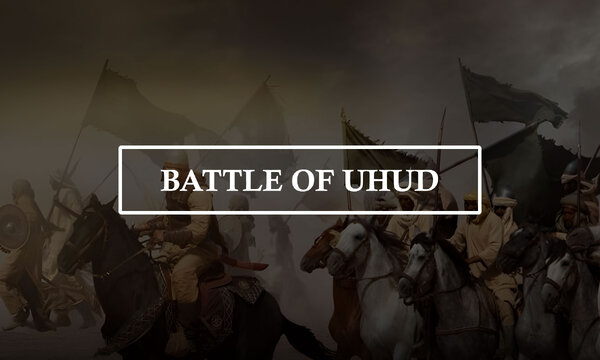The Main Reason for the Battle of Uhud
The Battle of Badr, which preceded the Battle of Uhud, had a significant impact on the minds of the pagans, especially after their defeat at the hands of the Muslims. This defeat strengthened the resolve of the pagans to fight against the Muslims for the following reasons:
Seeking revenge and retaliation.
Restoring their prestige among the Arab tribes.
Securing their trade routes to the Levant.
Parties of the Battle of Uhud
The Battle of Uhud took place between the pagans and the Muslims. The Quraysh gathered three thousand fighters led by Sufyan ibn Harb and set out towards the city of Medina. When the Prophet Muhammad (peace be upon him) learned of the pagans' intentions, he gathered his companions and consulted them on how to confront the pagans.
Then he led the Muslims to the mountain of Uhud outside of Medina, and their number was approximately one thousand fighters. However, Abdullah ibn Abi Salul, the leader of the hypocrites, returned with three hundred fighters, reducing the number of Muslims to seven hundred fighters.
Where and When the Battle of Uhud Occurred
The Battle of Uhud took place on the 7th of Shawwal in the third year of the Hijrah (Migration to Medina). The Prophet Muhammad (peace be upon him) had consulted his companions about going out to confront the pagans. His initial plan was to meet the pagans inside the city of Medina so that when the pagans arrived, they would engage in a more intense battle. If the pagans entered the city, they would fight them from narrow passageways and the entrances to the city, with women positioned on the rooftops.
However, those who had missed the Battle of Badr and were eager for combat, such as Hamza ibn Abd al-Muttalib, had a different opinion and suggested leaving the city to face the pagans. The Prophet accepted their advice. When they realized that they had gone against the Prophet's initial preference, they offered to agree to confront the pagans within the city. The Prophet responded, "A prophet should not wear his armor until he has worn it to fight". So they set out to Uhud, positioned themselves with their backs to Uhud, and directed their faces toward the city.
Preparations for the Battle of Uhud
The Prophet (peace be upon him) organized the army for battle, positioning fifty archers on the hill of Ar-Rumah on the western side to protect their rear from the horses of the pagans. He told them, "Do not leave your positions, whether you see us victorious or defeated". This meant that they should hold their ground regardless of the outcome of the battle.
The Prophet (peace be upon him) divided the army into three battalions:
A battalion led by Qais bin Sa'id.
A battalion for the Muhajireen (emigrants), which was led by Ali bin Abi Talib (may Allah be pleased with him), although it is also suggested that it might have been led by Mus'ab bin Umair.
A battalion for the Ansar (helpers) was led by al-Hubab bin al-Mundhir, although some sources suggest it might have been led by Sa'ad bin Ubada.
On the other side, the pagans were also preparing for the Battle of Uhud, led by Abu Sufyan ibn Harb. Khalid ibn al-Walid was stationed on the right wing of the army, 'Ikrimah ibn Abi Jahl on the left wing, Sufwan ibn Umayya led the infantry, and 'Abdullah ibn Abi Rabi'a commanded the archers.
Sufyan's Attempt to Dampen the Muslims' Spirits
The Prophet Muhammad (peace be upon him) prayed with the people on Friday and then urged them to remain steadfast, giving them the glad tidings of victory if they made an effort. He then led them in the afternoon prayer. The Muslims gathered for battle. However, before the battle between the Muslims and the pagans broke out, the Quraysh attempted to sow discord and division among the ranks of the Muslims.
Sufyan ibn Harb was sent by the Quraysh to approach the Ansar and said, "Let us resolve our differences with the help of our cousin (the Prophet), so we can avoid fighting you". However, the Ansar did not pay attention to his words and responded in a manner that he disliked because of their strong faith in Allah.
However, the Quraysh did not give up their attempts to weaken the Muslims. They sent the sinful monk Abd Amr ibn Sufyan, who openly declared hostility and incited the pagans to fight against the Muslims. However, their efforts were in vain because the hearts of the Muslims were filled with faith and righteousness.
The Battle of Badr, which preceded the Battle of Uhud, had a significant impact on the minds of the pagans, especially after their defeat at the hands of the Muslims. This defeat strengthened the resolve of the pagans to fight against the Muslims for the following reasons:
Seeking revenge and retaliation.
Restoring their prestige among the Arab tribes.
Securing their trade routes to the Levant.
Parties of the Battle of Uhud
The Battle of Uhud took place between the pagans and the Muslims. The Quraysh gathered three thousand fighters led by Sufyan ibn Harb and set out towards the city of Medina. When the Prophet Muhammad (peace be upon him) learned of the pagans' intentions, he gathered his companions and consulted them on how to confront the pagans.
Then he led the Muslims to the mountain of Uhud outside of Medina, and their number was approximately one thousand fighters. However, Abdullah ibn Abi Salul, the leader of the hypocrites, returned with three hundred fighters, reducing the number of Muslims to seven hundred fighters.
Where and When the Battle of Uhud Occurred
The Battle of Uhud took place on the 7th of Shawwal in the third year of the Hijrah (Migration to Medina). The Prophet Muhammad (peace be upon him) had consulted his companions about going out to confront the pagans. His initial plan was to meet the pagans inside the city of Medina so that when the pagans arrived, they would engage in a more intense battle. If the pagans entered the city, they would fight them from narrow passageways and the entrances to the city, with women positioned on the rooftops.
However, those who had missed the Battle of Badr and were eager for combat, such as Hamza ibn Abd al-Muttalib, had a different opinion and suggested leaving the city to face the pagans. The Prophet accepted their advice. When they realized that they had gone against the Prophet's initial preference, they offered to agree to confront the pagans within the city. The Prophet responded, "A prophet should not wear his armor until he has worn it to fight". So they set out to Uhud, positioned themselves with their backs to Uhud, and directed their faces toward the city.
Preparations for the Battle of Uhud
The Prophet (peace be upon him) organized the army for battle, positioning fifty archers on the hill of Ar-Rumah on the western side to protect their rear from the horses of the pagans. He told them, "Do not leave your positions, whether you see us victorious or defeated". This meant that they should hold their ground regardless of the outcome of the battle.
The Prophet (peace be upon him) divided the army into three battalions:
A battalion led by Qais bin Sa'id.
A battalion for the Muhajireen (emigrants), which was led by Ali bin Abi Talib (may Allah be pleased with him), although it is also suggested that it might have been led by Mus'ab bin Umair.
A battalion for the Ansar (helpers) was led by al-Hubab bin al-Mundhir, although some sources suggest it might have been led by Sa'ad bin Ubada.
On the other side, the pagans were also preparing for the Battle of Uhud, led by Abu Sufyan ibn Harb. Khalid ibn al-Walid was stationed on the right wing of the army, 'Ikrimah ibn Abi Jahl on the left wing, Sufwan ibn Umayya led the infantry, and 'Abdullah ibn Abi Rabi'a commanded the archers.
Sufyan's Attempt to Dampen the Muslims' Spirits
The Prophet Muhammad (peace be upon him) prayed with the people on Friday and then urged them to remain steadfast, giving them the glad tidings of victory if they made an effort. He then led them in the afternoon prayer. The Muslims gathered for battle. However, before the battle between the Muslims and the pagans broke out, the Quraysh attempted to sow discord and division among the ranks of the Muslims.
Sufyan ibn Harb was sent by the Quraysh to approach the Ansar and said, "Let us resolve our differences with the help of our cousin (the Prophet), so we can avoid fighting you". However, the Ansar did not pay attention to his words and responded in a manner that he disliked because of their strong faith in Allah.
However, the Quraysh did not give up their attempts to weaken the Muslims. They sent the sinful monk Abd Amr ibn Sufyan, who openly declared hostility and incited the pagans to fight against the Muslims. However, their efforts were in vain because the hearts of the Muslims were filled with faith and righteousness.
Prilozi
-
161.5 KB Pregleda: 227




